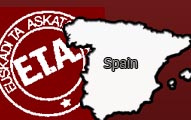Divisions deepen within a weakened ETA
 Madrid - When Txeroki, the suspected military leader of the militant Basque separatist group ETA, was captured in France on Monday, Spanish politicians hailed the arrest as yet another step towards the unavoidable defeat of separatist violence.
Madrid - When Txeroki, the suspected military leader of the militant Basque separatist group ETA, was captured in France on Monday, Spanish politicians hailed the arrest as yet another step towards the unavoidable defeat of separatist violence.
Yet while ETA has been seriously weakened by constant police crackdowns, it has always found new leaders and rebuilt its infrastructure, analysts pointed out.
At the same time, however, the police campaign is believed to have contributed to deepening divisions within ETA and its entourage, with the appearance of a current that is questioning the usefulness of a violent strategy in the campaign for an independent Basque homeland.
Txeroki, real name Mikel Garikoitz Aspiazu Rubina, is thought to have led ETA's military operations since 2004, planning and ordering car bombings.
The 35-year-old was known as a particularly violent hardliner who was partly responsible for the collapse of the government's attempt to negotiate with ETA in 2006.
Txeroki ordered the car bombing that violated ETA's ceasefire by killing two people at a Madrid airport underground parking lot in December 2006.
After the official end of the ceasefire the following June, Txeroki launched a wave of attacks that killed four people, in what was seen as an attempt to force the government to resume negotiations on ETA's terms.
Txeroki's inflexibility is believed to have deepened divisions in the ranks of radical separatists between hawks like him and others who believe that ETA's violence is increasingly isolating it within Basque society.
The overwhelming majority of Basques, including non-violent separatists, reject the group, which has killed more than 820 people since 1968.
The support for independence has declined to its lowed level since 2001, with only 22 per cent of Basques clearly backing the northern region's secession from Spain, according to a recent poll by the Basque regional government.
Those considering a more peaceful, politically orientated rather than military strategy reportedly include Arnaldo Otegi, leader of ETA's outlawed political wing Batasuna, and some imprisoned veteran ETA activists.
During the repressive dictatorship of General Francisco Franco, who ruled Spain from 1939 to 1975, ETA was respected by many Europeans as a national liberation movement.
Yet after Spain became a democracy and the Basques won a large measure of self-government, ETA has gradually been reduced into what most Spaniards see as little more than a criminal gang.
The group that once boasted nearly 1,000 members now has less than 200 of them, among whom only about 50 have been trained to carry out attacks, according to figures quoted by the daily El Mundo.
ETA leaders have been captured in some half a dozen police swoops since 1986, and hundreds of lower-ranking ETA members have been arrested.
The judiciary has also clamped down on ETA, recently banning two Basque parties that had emerged as successors to Batasuna, which was outlawed in 2003.
While the crackdowns have decimated ETA, the group has nevertheless shown itself capable to rebuild its operative cells within just a few months.
Groups of pro-ETA street hooligans supply a permanent pool of new ETA members.
The new activists are less experienced, less knowledgeable about the ideological basis of the Basque struggle, and get caught more easily than the previous generation.
Many of them are, however, markedly violent, and Txeroki was expected to be replaced by Aitzol Iriondo, whom media reports described as representing an even harder line. (dpa)